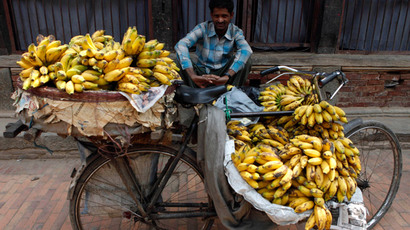War on chocolate: Fungus that attacks cocoa plants reproduces by cloning, study says

Chocolate lovers, brace yourselves. Your favorite sweet treat is at war with a fungus that reproduces by cloning, according to a new study. The fungal disease, which poses a serious threat to cocoa plants, was previously thought to multiply sexually.
It was traditionally believed that the fungus Moniliophthora roreri – which causes frosty rot pot, a disease which has devastated cocoa plantations throughout the Americas – reproduced sexually, because it belongs to a group of fungi that produces mushrooms through sexual means.
However, researchers at Purdue University have determined that the fungus actually generates billions of cocoa pod-destroying spores through cloning – despite having two mating types and seemingly functional mating genes.

World’s most popular banana faces eradication by deadly fungus
"This fungus is phenomenally unusual – it has mating types but doesn't undergo sexual reproduction," Jorge Díaz-Valderrama, doctoral student in mycology, said in a
statement. "This knowledge is biologically and economically valuable as we seek better insights into how mushrooms come about and how we can reduce this disease's damage to the cocoa industry."
Despite possessing two mating types, Díaz-Valderrama and colleague Catherine Aime, an associate professor of mycology, couldn't find any evidence that the two types were combining in the field or the lab. In addition, no record of M. roreri mushrooms exist – a further sign that the fungus is reproducing through cloning.
"Fungi usually start reproducing via cloning when they're very well suited for their environment," Aime said. "In terms of resources, sex is expensive while cloning is a cheap and easy way to produce a lot of offspring."
Interestingly, while both mating types were found in South America, only one type was found in Central America. This finding supports the hypothesis that the fungal disease originated in South America and was more recently introduced into Central America, where it rapidly spread via cloning.
Frosty rot pot has wreaked havoc on cocoa plantations in much of the Americas, dropping cocoa yields by up to 100 percent in some areas, and forcing many farmers to abandon their plantations. Brazil is currently the only cocoa-producing country in the continental Americas to remain untouched by the fungal disease. Much of the world's cocoa production has relocated to West Africa, partly due to the spread of frosty rot pot.
But although frosty rot pot remains a very real threat to cocoa plants, chocolate lovers shouldn't panic just yet, according to Díaz-Valderrama.
"We're working on identifying biochemical components that could be useful for controlling frosty pod rot and protecting vulnerable cacao-growing regions,” he said.






Comments
Post a Comment